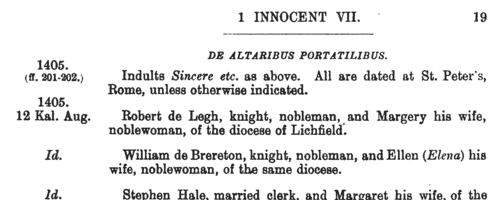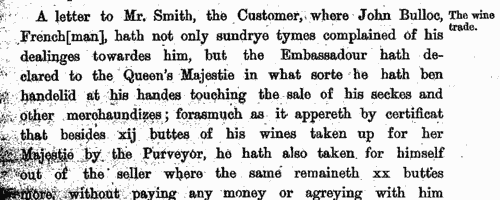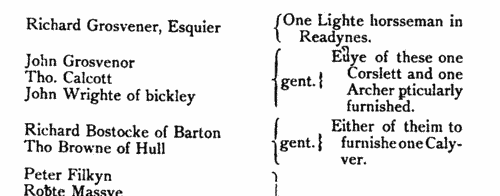Fytton Surname Ancestry ResultsOur indexes 1000-1999 include entries for the spelling 'fytton'. In the period you have requested, we have the following 21 records (displaying 1 to 10): Buy all | | | Get all 21 records to view, to save and print for £94.00 |
These sample scans are from the original record. You will get scans of the full pages or articles where the surname you searched for has been found. Your web browser may prevent the sample windows from opening; in this case please change your browser settings to allow pop-up windows from this site. Norfolk Feet of Fines
(1196-1307)
Pedes Finium - law suits, or pretended suits, putting on record the ownership of land in Norfolk. These abstracts were prepared by Walter Rye.FYTTON. Cost: £4.00.  | Sample scan, click to enlarge

| Grantees of offices, commissions and pardons
(1317-1321)
The Patent Rolls are the Chancery enrolments of royal letters patent. Those for the 11th to the 14th years of the reign of king Edward II (8 July 1317 to 7 July 1321) were edited for the Public Record Office by G. F. Handcock, and published in 1903. The main contents are royal commissions and grants; ratifications of ecclesiastical estates; writs of aid to royal servants and purveyors; and pardons. Most extensive are the commissions of oyer and terminer to justices to investigate complaints about specific crimes and wrongs in particular counties.FYTTON. Cost: £2.00.  | Sample scan, click to enlarge

| Inhabitants of Cheshire and North Wales
(1390-1399)
The county of Cheshire had palatine status, being in some measure independent of the rest of England: moreover, from the Statute of Wales of 1284, after king Edward I's subjugation of North Wales, until the union of England and Wales in 1536 to 1543, much of the administration of North Wales (county Flint in particular) was directed from Chester. When the Chester Recognizance Rolls were moved from Chester to the Public Record Office, they were placed among the Welsh Records. These rolls, so called because they do include recognizances (of debts &c.) among their contents, are in fact the Chancery Rolls of the palatinate, containing enrolments of charters, letters patent, commissions and other documents issued under the seal of the palatinate. Deeds and other evidences of a private nature were also enrolled on them. A calendar of the Recognizance Rolls from their commencement to the end of the reign of Henry IV was prepared by Peter Turner and included in the 36th Annual Report of the Deputy Keeper of the Public Records in 1875. We have now indexed this, dividing the enrolments into decades. This is the period from the 13th year of king Richard II, who had intended to raise the earldom of Chester into a principality, to his overthrow by Henry IV.FYTTON. Cost: £6.00.  | Sample scan, click to enlarge

| Chester Plea Rolls
(1399-1413)
This calendar of the deeds, inquisitions and writs of dower on the plea rolls of the palatinate of Chester of the reign of Henry IV was edited by Peter Turner for the Public Record Office. As well as the records relating to the settling of landed property, there are several inquisitions post mortem and a number of grants of pardon to erstwhile adherents of Richard II.FYTTON. Cost: £6.00.  | Sample scan, click to enlarge

| Indults for Portable Altars: Diocese of Coventry and Lichfield
(1404-1415)
Individuals (laymen, monks or priests) could obtain indults or indulgences from the Pope to possess portable altars, enabling them to do their devotions in unconsecrated places. The fee was 10 groats for one person, 12 for two (frequently a husband and wife). Lists of these indults, headed De Altaris Portatilibus, were entered in the Lateran Regesta in the Vatican archives; from the reigns of popes Innocent VII to John XXIII (1404 to 1415) there are such lists in volumes CXIX, CXXXI, CLIX to CLXI, CLXV, CLXVII and CLXXXIV, from the first year of Innocent VII, the second year of Gregory XII, and the second to fifth years of John XXIII. Those relating to the British Isles were copied and translated by J. A. Twemlow, and printed under the direction of the Master of the Rolls in 1904. The diocese of Coventry and Lichfield included Staffordshire, Derbyshire, Cheshire, Lancashire south of the Ribble, and northern Shropshire and northern Warwickshire.FYTTON. Cost: £4.00.  | Sample scan, click to enlarge

| Lichfield Diocese Ordinations: Acolytes Regular
(1508)
The diocese of Coventry and Lichfield at this period included the whole of Cheshire, Staffordshire and Derbyshire; all Lancashire south of the Ribble; northern Shropshire (including Shrewsbury); and northern Warwickshire (including Birmingham and Coventry). Ordinations took place on the four Ember Saturdays in the year, and on certain other occasions; lists of ordinands to the degrees of acolyte, subdeacon, deacon and priest were preserved in the ordination registers, a distinction being made between those clerks who were 'regular', i. e., monks, friars, &c., and those who were 'secular', the main body of the clergy. All ordinands were celibate, and those regular, and the secular who obtained benefices, remained so, but only a minority of the secular ordinands ever obtained benefices, and most will doubtless have married later in life. No man might be ordained to subdeacon or higher without proving either that he was of independent means or that he was sponsored by an institution or a gentleman. Most entries in the register of such ordinations therefore have the words 'ad titulum' followed by the name of the religious house that was the sponsor. This is an important indication of the man's origins - boys whose families were monastic tenants, and who were educated by the monks, would naturally be sponsored by the abbey. Only men who were born and bred in the diocese could be ordained by the bishop, unless producing letters dimissory from the bishop of the diocese of their birth. These are the ordinations celebrated 15 July 1508, by Thomas bishop of Panados (Pavados), suffragan of bishop Geoffrey Blythe, in Warrington priory.FYTTON. Cost: £8.00.  | Sample scan, click to enlarge

| Lichfield Diocese Ordinations: Subdeacons Secular (1512)
The diocese of Coventry and Lichfield at this period included the whole of Cheshire, Staffordshire and Derbyshire; all Lancashire south of the Ribble; northern Shropshire (including Shrewsbury); and northern Warwickshire (including Birmingham and Coventry). Ordinations took place on the four Ember Saturdays in the year, and on certain other occasions; lists of ordinands to the degrees of acolyte, subdeacon, deacon and priest were preserved in the ordination registers, a distinction being made between those clerks who were 'regular', i.e., monks, friars, &c., and those who were 'secular', the main body of the clergy. All ordinands were celibate, and those regular, and the secular who obtained benefices, remained so, but only a minority of the secular ordinands ever obtained benefices, and most will doubtless have married later in life. No man might be ordained to subdeacon or higher without proving either that he was of independent means or that he was sponsored by an institution or a gentleman. Most entries in the register of such ordinations therefore have the words 'ad titulum' followed by the name of the religious house that was the sponsor. This is an important indication of the man's origins - boys whose families were monastic tenants, and who were educated by the monks, would naturally be sponsored by the abbey. Only men who were born and bred in the diocese could be ordained by the bishop, unless producing letters dimissory from the bishop of the diocese of their birth. These are the ordinations celebrated on Ember Saturday, 2 June 1512, by Thomas bishop of Panados (Pavados) suffragan of bishop Geoffrey Blythe, in Lichfield cathedral.
FYTTON. Cost: £8.00.  | Sample scan, click to enlarge

| Liegemen and Traitors, Pirates and Spies
(1558-1570)
The Privy Council of queen Elizabeth was responsible for internal security in England and Wales, and dealt with all manner of special and urgent matters
FYTTON. Cost: £4.00.  | Sample scan, click to enlarge

| Cheshire Knights, Esquires, Gentlemen and Freeholders: Macclesfield hundred
(1578)
This muster roll, dated 7 October 20 Elizabeth 1578, is entitled 'A booke conteyni'ge the numbre and names of all the knights, esquiers, and gent'm wth freehoulders wthin the countie of Chester, togethers wth their horses, armor and other furnyture of proporc'on beinge also devyded into seurall hundreds accordinge to their peculiar habitac'ons'. Full names are given, with the details of the horsemen, archers, arms and armour each was required to furnish. There are returns from all seven hundreds of the county - Broxton (Broxon), Bucklow (Buckley), Eddisbury (Edisburie), Macclesfield (Mackesfeilde), Nantwich (Namplewiche), Northwich (Northwicke) and Wirral. FYTTON. Cost: £4.00.  | Sample scan, click to enlarge

| Penshurst Manuscripts
(1150-1580)
C. L. Kingsford prepared a calendar of the papers of Lord de L'Isle and Dudley at Penshurst Place in Kent for the Historical Manuscripts Commission, of which this first volume was published in 1925. The material is presented in eleven sections: I. 39 deeds relating to the Sydney family's Surrey and Sussex estates from about 1150 to 1502; II. Summary notes on deeds from these and other English counties (mainly Essex, Kent, Lincolnshire and Yorkshire) and from Wales and Ireland; III. Documents relating to Robertsbridge Abbey in Sussex (charters and deeds; rentals; court rolls; reeve's accounts at Footland; and bursar's accounts) from 1160 onwards; IV. Deeds and documents relating to the church and college of Tattershall in Lincolnshire (deeds; statutes and ordinances; miscellaneous papers; court rolls; and accounts (warden's, steward's, precentor's and impositor's, receiver's, bailiffs', and building and post-dissolution accounts); V. Family papers and estates accounts of the Cromwells of Tattershall (general accounts and wills; accounts of stewards of the household; building accounts of Tattershall castle; estate accounts); VI. Summary lists of various rolls, rentals, surveys and accounts, from various counties (mainly Kent and Lincolnshire); VII. Documents relating to Penshurst and its owners; VIII. Sydney family papers; IX. Accounts of the ironworks at Robertsbridge and in Glamorgan; X. Papers relating to the Council of Wales, 1526 to 1580; and XI. Irish Accounts, from sir Henry Sydney's terms as Vice-Treasurer and Lord Deputy of Ireland, 1556 to 1578.FYTTON. Cost: £4.00.  | Sample scan, click to enlarge

|
Research your ancestry, family history, genealogy and one-name study by direct access to original records and archives indexed by surname.
|












